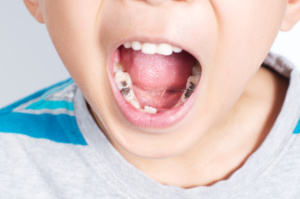 It’s no secret that sugar — one of the things kids love most — is also one of the most damaging to their teeth. And suffice it to say, sugar is in just about everything, especially beverages. In fact, as much as sports drinks are harmful to your teeth, researchers found that exposure to energy drinks such as Rockstar, Monster®, and Red Bull® resulted in twice as much enamel loss as exposure to sports drinks such as Powerade®, Gatorade®, and Propel® (3.1% to 1.5%). While avoiding sugar may seem difficult, it isn’t impossible, and pediatric dentists say that incorporating some naturally sweet substitutes into your children’s diet can help satisfy their sweet tooth without causing the damage of traditional sugar. Here are just a few natural sugar substitutes to include in your child’s diet.
It’s no secret that sugar — one of the things kids love most — is also one of the most damaging to their teeth. And suffice it to say, sugar is in just about everything, especially beverages. In fact, as much as sports drinks are harmful to your teeth, researchers found that exposure to energy drinks such as Rockstar, Monster®, and Red Bull® resulted in twice as much enamel loss as exposure to sports drinks such as Powerade®, Gatorade®, and Propel® (3.1% to 1.5%). While avoiding sugar may seem difficult, it isn’t impossible, and pediatric dentists say that incorporating some naturally sweet substitutes into your children’s diet can help satisfy their sweet tooth without causing the damage of traditional sugar. Here are just a few natural sugar substitutes to include in your child’s diet.
Maple Syrup
Maple syrup, believe it or not, is ideal for sweetening foods. It can be consumed with a number of foods, and studies have shown that it can even help to prevent cancer due to antioxidants called polyphenols. If you buy maple syrup, make sure it’s real — avoid cheap syrup substitutes that are filled with high fructose corn syrup and other chemical additives. From breakfast foods to baking and more, maple syrup may be the perfect sugar substitute.
Mashed Organic Fruit
Pureed or mashed fruits can be a sweet, healthy, and delicious alternative to cane sugar and other processed sugars. Plus, it can be used in a number of kid-friendly ways.
“Whole fruit contains the fiber and protein that is removed from fruit juice, so liquefying whole pieces of fruit is a more nutritious option than fruit juice. Bananas, apples or berries can take the place of sugar when making muffins, can be added to pancakes and smoothies, and poured over oatmeal or other hot cereal,” writes Radha McLean on EcoWatch.
Organic Honey
Finally, honey is one of the most natural and versatile sweeteners on the planet. It can be used in countless recipes to enhance flavor. Honey also contains small amounts of some essential vitamins, including riboflavin, niacin, copper, calcium, pantothenic acid, iron, phosphorous, manganese, zinc, and potassium oxide.
Ultimately, making small substitutions for natural sugars in your child’s diet can help keep them healthier and prevent decay. For more information about pediatric dentists, contact Smilez Pediatric Dental Group.
